NHS Wales is not functional, says BMA head Iona Collins
 Getty Images
Getty ImagesWales does not have a functioning NHS and people do not have faith in it, claims the head of a doctors' union.
Dr Iona Collins, of the British Medical Association in Wales, said people suffering with chest pain "don't even know" if an ambulance will come.
Latest figures show a higher percentage of people are waiting two years or more for treatment in Wales than England.
The Welsh government said it's spending more to help the NHS recover from the pandemic and cut waiting times.
One patient who has given up waiting for a hip replacement will travel to Lithuania for treatment on Monday, paying £10,000.
Nicky Morris from Aberaman, Rhondda Cynon Taf, waited 18 months before she saw a consultant.
She was shocked when she then called her local hospital, the Royal Glamorgan in Llantrisant, for an update and said she was told no planned orthopaedic operations had been performed there since 2020.
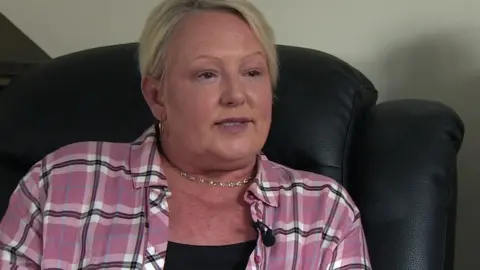
Mrs Morris asked: "'Am I safe to say that in two years' time is when you're going to be catching up?", and said the person she spoke to could not even say that would be the case.
But time is not on Mrs Morris's side, as she has a muscle wasting condition which means delaying the operation could mean she would never be able to walk again.
She will go to Lithuania to get the hip operation done privately, which is costing her £10,000 and has meant her partner has had to take out a loan on his house.
"It's going to take me five years to pay off this hip replacement, and yet for 35 years I've paid National Insurance, I've paid my taxes. I've never been out of work, never needed the NHS more than I do now," she said.
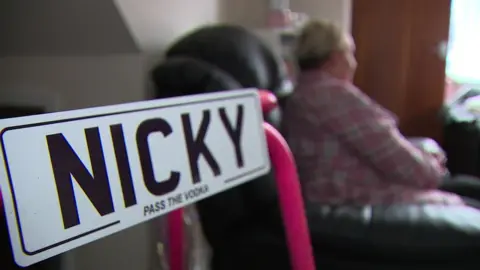
Mrs Morris added: "If I don't go to Lithuania and I wait for the operation, I've got the potential that my underlying condition will now get to the point where I have no muscle to actually walk.
"If I'm no longer able to have surgery, that's it. My life will be over at 52."
In a statement, the board responsible for the Royal Glamorgan Hospital said: "More than 3,750 orthopaedic operations were carried out across Cwm Taf Morgannwg University Health Board in the past two years, with 900 of these taking place at Royal Glamorgan Hospital."
It said this did include planned operations.
'People do not have faith'
Figures for February show more than 37,000 people are waiting more than two years for treatment in Wales, around 5% of those waiting.
That is down from around 60,000 last July, or 8% of the total.
But the figures for England are much lower, currently standing at 0.014%.
Dr Collins told BBC Politics Wales that despite the fall in numbers, Mrs Morris's case was "a symptom of failure," and the situation was desperate.
"We do not have a functioning service now. People do not have faith in the service," she said.
"If you have chest pain you don't even know if an ambulance is necessarily going to come. We see really tragic reports in the press where people arrive too late."
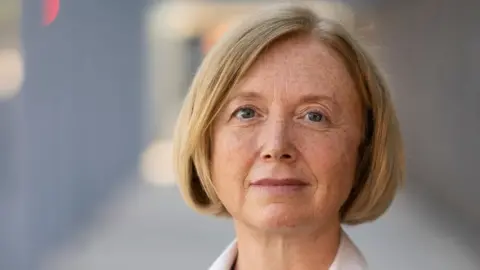 Matthew Horwood
Matthew HorwoodHowever, Mark Dayan from the health think tank the Nuffield Trust, said there had been some improvement.
"If you look at figures from the last few months, on the one hand there has been some progress in a number of things in waiting times in Wales," he said.
"They've actually improved for urgent care, and at the same time the gap for the average person on the waiting list has shrunk with England.
"However, when you compare Wales to Scotland and England, the absolute amount of time that people are waiting is still considerably longer, particularly at the longest end."
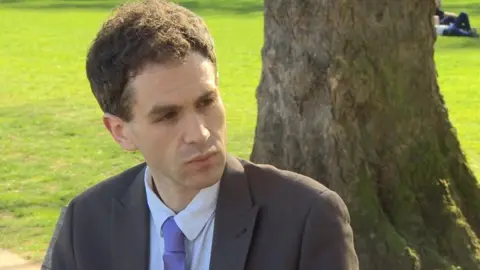
On the different figures for the longer waiting lists, he added: "It's probably true that the health services in England and Scotland have put a particularly aggressive emphasis on cutting off the longer waiters first, and had some success in doing that.
"But it's not indisputably a good thing, because actually there is a really difficult moral choice to make between the person who's been on the list for longest and the person who actually needs care most."
Age Cymru head of policy Heather Ferguson said: "There is much that can be done to reduce the effects of long waiting times such as clinicians providing their patients with advice on waiting well to help prevent conditions deteriorating.
"We are worried that if older people are forced to wait too long for their procedures that their condition will deteriorate, leading to a loss of self-confidence, and a gradual withdrawal from life."
On the thousands of people waiting more than two years for surgery, Health Minister Eluned Morgan told Politics Wales: "If you look at the percentage drop, in particular, for those longest waits, we're now 47% down on where we were this time last year.
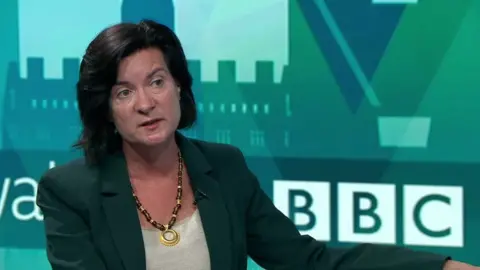
"Now, we've got a long way to go and what we do know is the way that we count our waiting lists is very different from England."
In April 2022, the Welsh government published a new strategy to reduce the number of people waiting for an NHS operation.
The first target around outpatient appointments was missed and it is on course to also miss the second target of eliminating the number of people waiting more than two years in most specialities by March 2023.
Asked if the Welsh government needs to revisit its strategy, Ms Morgan replied: "I think it's very important that we set very stretching targets for the health boards.
"We've galvanised the health boards to really focus on that. They haven't gone as quickly as we'd like, they haven't perhaps prioritised in the way that we hoped in terms of the longest waits and we have regular meetings with them to really push them.
"It took a long time to get started and we're now in a situation where the system is moving through these waiting lists a lot quicker than they were at the start of the process," she added.
In March, ambulance response times were the second worst on record, with only 47.5% of immediately life-threatening "red" calls attended to within the target eight minutes.
'Massive increase in demand'
It was the 32nd month in a row where the target to reach 65% of emergency calls within eight minutes was not met.
Ms Morgan said: "I think what we need to recognise is the massive increase that we've seen in terms of demands on the most urgent cases. We've seen a 93% increase in red calls since 2019.
"80% of those red calls are answered within 15 minutes. Now, that's not our target.
"It's still not good enough and we still need to do better and that's why we're ploughing money in to the Welsh ambulance service," she added.
On Dr Collins's comments, a Welsh government spokesperson added: "We are proud of our NHS, the first universal health system of its kind.
"We have committed more than £1bn extra this Senedd term to help the NHS recover from the pandemic and cut waiting times.
"We are working with health boards and have set ambitious but realistic targets to tackle the pandemic backlog for planned care, backed by significant extra long-term funding."
Politics Wales is on BBC One Wales, Sunday 23 April, 14:30 BST